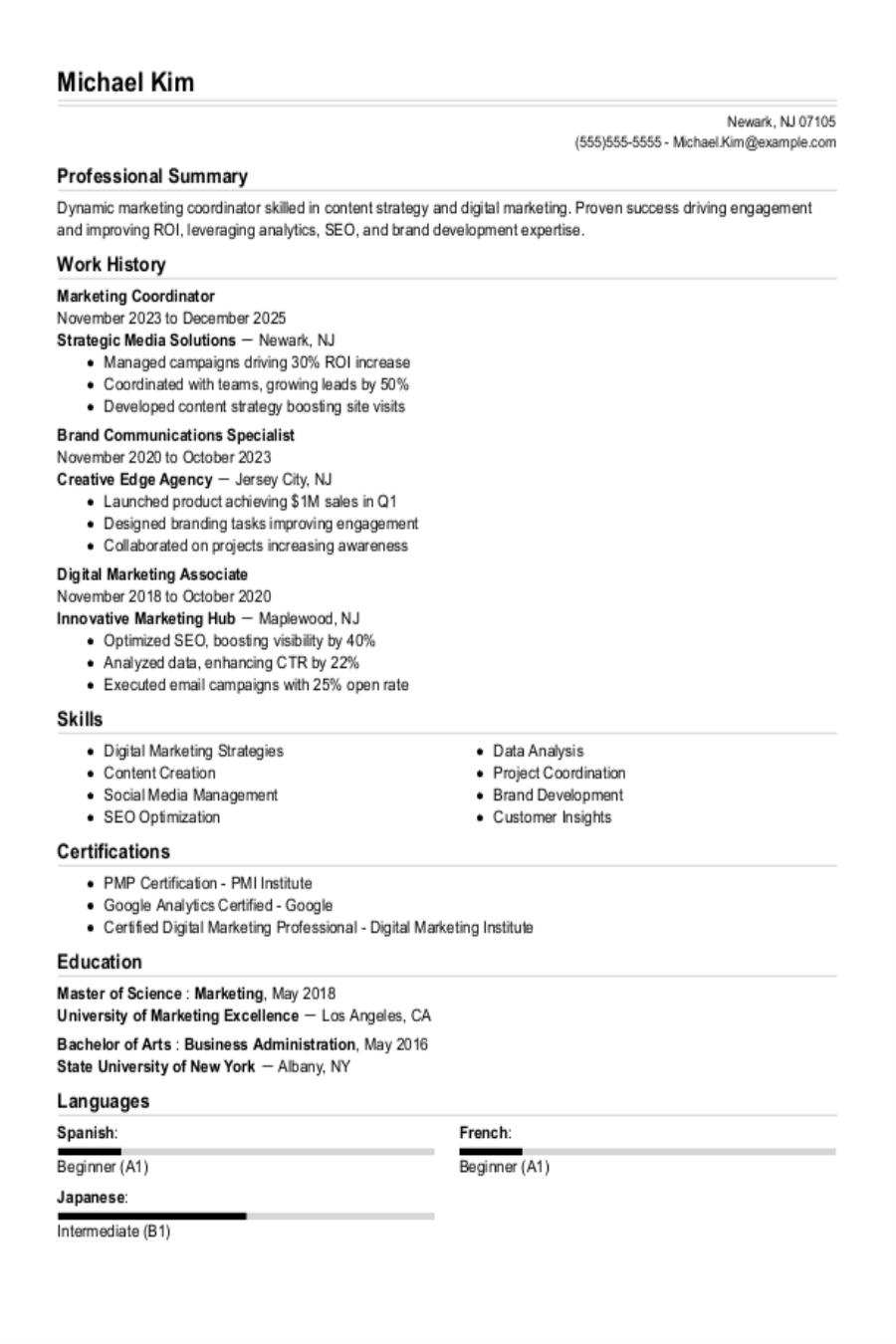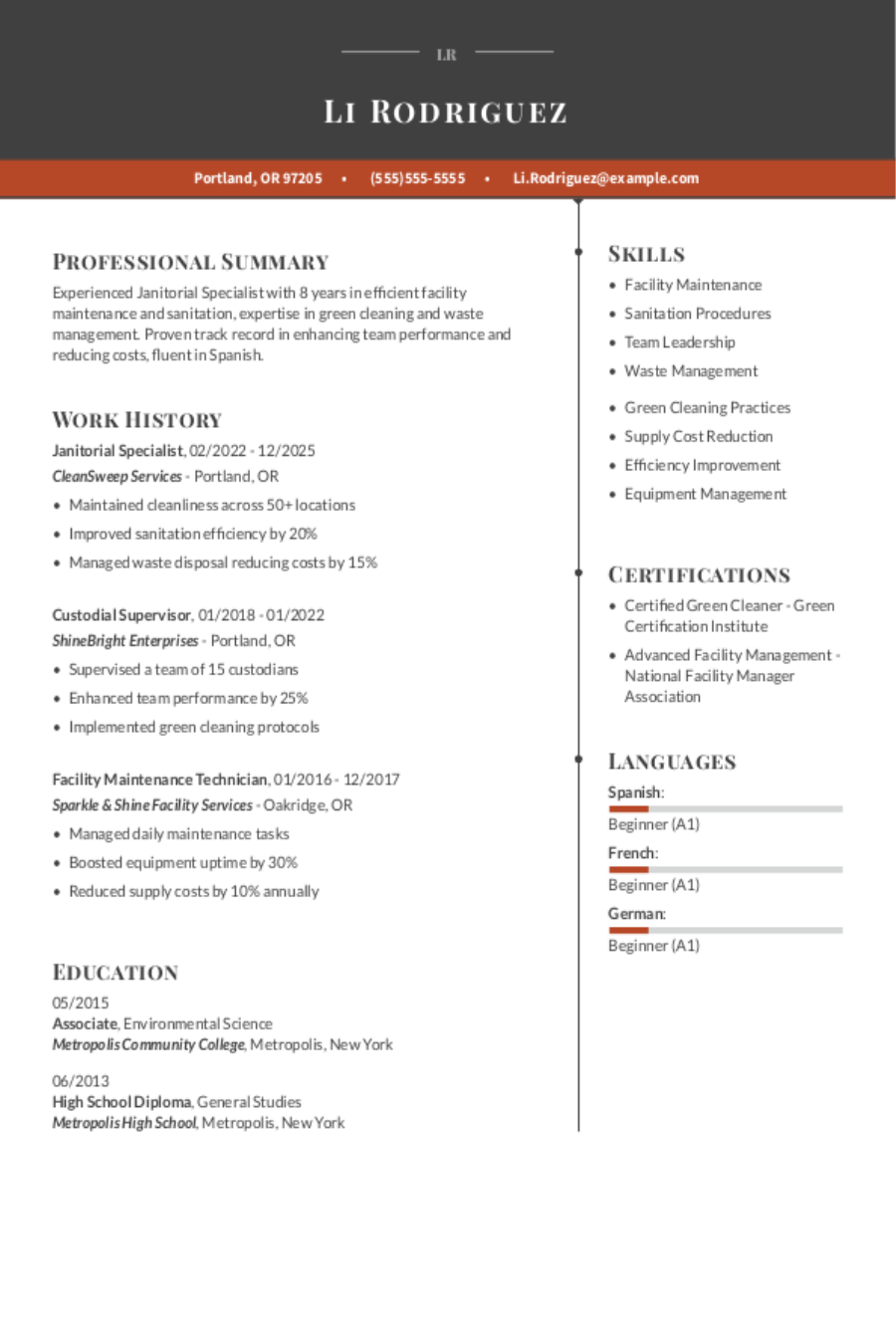Popular Accountant Resume Examples
Entry-level accountant resume
An entry-level resume for an accountant should highlight relevant coursework, internships, certifications like CPA, and essential skills such as attention to detail, analytical thinking, and skill in accounting software.
Emphasis on soft skills: This resume emphasizes the job seeker's soft skills, including analytical abilities and attention to detail, which effectively compensate for limited experience. For instance, their success in reducing financial reporting errors by 25% demonstrates a commitment to accuracy and efficiency in accounting tasks.
Focuses more on skills than work history: Using a functional resume format strategically highlights this candidate's skills in financial reporting and budget management, showcasing accomplishments like reducing errors by 25% rather than focusing solely on my work history.
Mid-career accountant resume
A mid-career accountant resume should emphasize a strong combination of relevant experience, technical skills, and ongoing professional development to effectively demonstrate growth and adaptability in the finance industry.
Balanced skills section: This applicant effectively demonstrates a mix of hard skills, such as financial reporting and tax preparation, alongside soft skills like strategic planning and teamwork, showcasing their well-rounded professional capabilities.
Active language: Using strong action verbs such as "managed" and "implemented" emphasizes significant contributions, showcasing initiative in reducing errors and optimizing cost-saving strategies.
Experienced accountant resume
An experienced accountant resume should prioritize highlighting key achievements, relevant skills, and a clear overview of career progression to effectively demonstrate expertise and value to potential employers.
Concise professional summary: The resume's opening summary effectively showcases over 13 years of accounting experience, giving the reader an immediate understanding of the candidate's key skills.
Reverse-chronological experience: Using the chronological resume format, the job seeker's extensive experience is clearly illustrated, effectively showcasing their career progression through a structured timeline. This format highlights achievements and responsibilities across various roles in accounting.
No experience accountant resume
A resume for an applicant with no experience should highlight relevant coursework, internships, and transferable skills to showcase the applicant's preparedness and enthusiasm for the accounting profession despite having no formal work experience.
Straightforward: Job seekers often feel pressured to embellish their resumes with complex terminology. Avoiding jargon helps this candidate communicate their skills clearly.
Accomplishments section: Incorporating relevant coursework and academic accomplishments helps highlight the job seeker's readiness for an accountant role, showcasing applied knowledge even with limited professional experience.
Accountant Resume Template
Looking to create a standout application? Use this accountant resume template as your starting point — simply personalize it with your own details and watch your career take off.
Hiro Huang
Albany, NY 12208
(555)555-5555
Hiro.Huang@example.com
Professional Summary
Detail-oriented accountant with 4 years of experience in financial reporting, data analysis, and budgeting. Proven track record of enhancing efficiency and saving costs. Skilled in compliance, tax preparation, and audits.
Work History
Accountant
Financial Solutions Group - Albany, NY
May 2023 - August 2025
- Managed financial reporting for M+ in assets
- Reduced operational costs by 10% through audits
- Streamlined payroll process saving 15 hours/month
Financial Analyst
Insight Analytics Corp - Buffalo, NY
March 2021 - April 2023
- Analyzed data to optimize budgets by 8%
- Forecasted trends increasing sales by 0K
- Evaluated investments leading to 12% profit rise
Junior Accountant
Greenfield Enterprises - Hillcrest, NY
May 2019 - February 2021
- Assisted in reconciling accounts reducing errors by 50%
- Prepared tax returns for clients with 98% accuracy
- Developed Excel tools saving 5 hours/task
Languages
- Spanish - Beginner (A1)
- French - Beginner (A1)
- Mandarin - Beginner (A1)
Skills
- Financial Reporting
- Data Analysis
- Budgeting
- Tax Preparation
- Auditing
- Accounts Reconciliation
- Excel Proficiency
- Regulatory Compliance
Certifications
- Certified Public Accountant (CPA) - American Institute of CPAs
- Financial Risk Manager (FRM) - Global Association of Risk Professionals
Education
Master of Science Accounting
University of Illinois Urbana-Champaign, Illinois
May 2019
Bachelor of Science Finance
Illinois State University Normal, Illinois
June 2017
Writing Your Accountant Resume
Having explored these effective resume examples, you're now equipped to delve into the nuances of how to write a resume. We'll walk you through this process methodically, breaking down each section to ensure clarity and confidence in your approach.
List your most relevant skills
Creating a compelling skills section on your accountant resume is important for showcasing your qualifications. You should highlight both your technical expertise, such as skill in accounting software and financial analysis, as well as essential soft skills like attention to detail and effective communication. By presenting these strengths clearly, you provide a snapshot of what you bring to the table that makes an immediate impact.
Incorporate keywords from the job listing directly into your skills section to demonstrate how well you align with the role and to help your resume pass through ATS.
Example of skills on an accountant resume
- Proficient in managing financial records and ensuring compliance with regulations
- Adept at preparing accurate financial statements and reports
- Strong analytical thinker with excellent problem-solving skills
- Effective communicator, able to collaborate with team members and clients
Employers highly value interpersonal abilities like communication and teamwork because they contribute significantly to a positive work environment and are often challenging to develop. Highlighting these traits can set you apart from other applicants.
Highlight your work history
The work experience section of your accountant resume is essential for making a strong impression. This part should focus on showcasing your achievements and demonstrating how you applied your accounting skills in real-world situations. By highlighting specific contributions and milestones, potential employers will better understand the value you can bring to their organization.
When detailing each job entry, be sure to include key information such as your job title, the employer’s name, and the dates of employment. Including this information not only provides context but also establishes your professional credibility. Make it a point to quantify your accomplishments wherever possible; numbers can effectively illustrate the impact of your work.
Example of an accountant work experience entry
- Accountant
Smith & Co. Accounting - New York, NY
June 2019 - Present - Prepare and analyze monthly financial statements for clients, ensuring compliance with GAAP standards and delivering actionable insights that improved client profitability by 15%
- Manage accounts payable and receivable processes, reducing outstanding invoices by 30% through effective follow-up strategies and negotiation skills
- Implement a new accounting software system that streamlined reporting processes, cutting monthly closing time from 10 days to 5 days
- Conduct quarterly tax preparation and planning for small businesses, resulting in an average tax savings of $20,000 per client annually
- Collaborate with cross-functional teams to develop budgets and forecasts, improving financial decision-making across the organization
Aim for clarity in your resume bullet points by focusing on key achievements. Use action verbs and quantifiable results to convey impact, ensuring each point is concise yet informative, ideally between one and two lines long.
Include your education
The education section of your accountant resume should outline your academic credentials in reverse-chronological order, starting with your most recent degree. Be sure to include relevant degrees, diplomas, and professional certifications. You can exclude your high school diploma if you possess a bachelor's degree or higher. This structured approach emphasizes your qualifications effectively.
If you are currently engaged in ongoing education or have not yet completed a program, indicate your highest attained level along with any expected graduation dates. It may also be helpful to detail relevant coursework or significant academic accomplishments through bullet points, especially if you're a new graduate or a student.
Common certifications for an accountant resume
- Certified Public Accountant (CPA) – American Institute of Certified Public Accountants (AICPA)
- Chartered Global Management Accountant (CGMA) – American Institute of CPAs (AICPA) and Chartered Institute of Management Accountants (CIMA)
- Certified Management Accountant (CMA) – Institute of Management Accountants (IMA)
- Enrolled Agent (EA) – Internal Revenue Service (IRS)
Sum up your resume with an introduction
Your resume profile is your chance to make a strong first impression. You can choose to create a goal-oriented resume objective or a more experience-focused professional summary.
If you're an experienced job seeker, a professional summary is particularly effective. It allows you to showcase key accomplishments and relevant skills right at the top of your resume. A resume objective, by contrast, displays your career development goals and works best for early-career candidates.
Professional summary example
Careful accountant with over 8 years of experience in both public and corporate sectors. Demonstrated success in optimizing financial reporting processes, reducing discrepancies, and improving compliance with regulatory standards. Proficient in using advanced accounting software and conducting thorough audits, ensuring accuracy and integrity in all financial statements.
Resume objective example
Enthusiastic accountant eager to apply strong analytical skills and attention to detail in a collaborative finance team. Committed to using skill in budgeting and financial reporting to improve operational efficiency and support informed decision-making for the organization’s growth.
As an accountant applicant, it's important to keep your resume profile concise yet packed with essential information. Aim for a maximum of three sentences that highlight your most relevant skills and experiences.
Add unique sections to set you apart
Optional resume sections can help you stand out as an accountant by highlighting your unique qualifications and experiences. These additional elements provide a broader picture of who you are beyond your work history.
Including sections on relevant hobbies or volunteer experiences enables potential employers to see how you align with their values while showcasing transferable skills. For instance, if you volunteer for a financial literacy program, it not only demonstrates your commitment to community service but also highlights your expertise in finance. Such insights can make a strong impression, illustrating that you're a well-rounded job seeker.
Three sections perfect for a accountant resume
- Languages: As an accountant, clear communication with clients and team members is essential. If you have skill in additional languages, highlight these language skills on your resume; they can improve client relationships and broaden opportunities in diverse markets.
- Volunteer Work: Including volunteer work on a resume not only improves your professional skills but also demonstrates your dedication to community engagement. It’s a great way to show potential employers that you are committed to making a positive impact.
- Achievements: In accounting, quantifiable accomplishments are important as they illustrate your impact on financial accuracy and efficiency. If you have measurable career achievements that don't fit under your experience section, create a new section to describe them.
5 Resume Formatting Tips
- Choose a format that matches your career stage.
When selecting a resume format, consider your career level and experience. If you're an experienced accountant, a chronological format highlights your career progression effectively. However, if you're just starting out or changing fields, a functional resume can emphasize your skills over your work history. For those with both substantial experience and relevant skills, the combination format may provide the best of both worlds.
- Pick a smart resume template.
Using a professional resume template is essential for improving readability and ensuring your formatting stands out. A well-designed template helps guide the eye, making it easier for hiring managers to quickly grasp your qualifications. If you prefer a custom format, remember to keep it clear and choose fonts that are compatible with applicant tracking systems (ATS) to increase your chances of getting noticed.
- Use an appropriate font.
When choosing a professional font for your resume, consider clear options like Helvetica, Georgia, or Arial. These fonts improve readability for both applicant tracking systems (ATS) and hiring managers, ensuring your qualifications are easily recognized and understood.
- Use consistent formatting.
Ensure your resume is consistently left-aligned with equal margins on all sides to create a polished and professional look that catches the eye of potential employers.
- Keep your resume to one or two pages.
When crafting your resume, remember that resumes should be one page long for most job seekers. If you have extensive experience, a two-page format can work, but ensure every detail is relevant and succinct to capture the attention of hiring managers effectively.
What’s the Average Accountant Salary?
Accountant salaries vary based on location, career level, and qualifications.
This data, provided by the Bureau of Labor Statistics, will show you expected salary ranges for accountants in the top 5 highest-paying states, including the District of Columbia. The figures reflect the most current salary data available, collected in 2024.
- Full Range
- Most Common (25th–75th percentile)
- Average
District of Columbia
Most common: $79,420 - $141,540
New York
Most common: $78,730 - $134,990
New Jersey
Most common: $79,640 - $129,080
California
Most common: $76,210 - $124,890
Massachusetts
Most common: $77,280 - $122,020
Tools for Your Job Search
Are you gearing up to apply for an accounting position that piques your interest? Before you hit the submit button, take advantage of our ATS Resume Checker. This powerful tool offers valuable feedback on how effectively your resume can navigate the automated systems that many financial firms rely on for initial applicant screening.
Seeking to elevate your application further? Our AI Resume Builder provides tailored content recommendations specifically designed for accountants. Along with professional templates, it will showcase your skills and achievements in a compelling manner.
Frequently Asked Questions
Last Updated: September 8, 2025
Absolutely. A cover letter is important because it adds depth to your resume and creates a valuable opportunity for communication with employers. It allows you to share your enthusiasm for the accounting role and illustrate how your skills and experience make you an ideal applicant. Don’t overlook this chance; write a cover letter that improves your application.
For a quick and effective solution, check out our AI Cover Letter Generator. It helps you create tailored cover letters in just minutes, with options for a cover letter template that perfectly matches your resume, ensuring a polished and professional presentation of your qualifications.
A resume is a concise document, typically one to two pages long, summarizing your skills and experiences. In contrast, a CV (curriculum vitae) can extend several pages and offers an in-depth look at your academic background, research contributions, publications, and professional experience.
You should use a CV when applying for positions in academia or specialized fields such as law or medicine. If you're unsure about creating a CV that stands out, our online CV Maker is here to help! With various tailored CV templates suited for different industries and career levels, crafting your perfect CV has never been easier—get started today!
An active LinkedIn presence is important for accountants seeking new opportunities. It allows you to network with industry professionals, share your expertise, and demonstrate your skills effectively, improving your visibility in a competitive job market.
To excel in your accountant interview, take time to practice common job interview questions and answers. This preparation not only boosts your confidence but also equips you to tackle any unexpected queries that may arise during the conversation.
For accountants, it's beneficial to briefly state your career goals in your resume summary, such as "Detail-oriented accountant aiming for a senior finance role." However, your cover letter is the ideal place for an in-depth discussion about your aspirations, emphasizing how specific positions can help you develop skills and gain experience aligned with your long-term career path. Targeting roles that offer growth opportunities is essential for advancement.
Was this information helpful? Let us know!
Hailey is a career advice writer dedicated to helping job seekers excel in their careers.
More resources

What If No One Responds When You Try To Follow Up After a Job Interview?
If no one responds after you try to follow up after a job inte...

How to List Adaptability Skills on Your Resume (35+ Examples, Definition & Tips to Improve)
Our adaptability skills definition and guide will help you wri...

What if I Don't Have Professional References?
Access advice on what to do if you get to the reference check ...

Advertising Resume: Examples & Templates
As an advertising professional you need a resume that capture...

Marketing Coordinator Resume: Examples & Templates
As a marketing coordinator you need a resume that highlights ...

Janitorial Resume: Examples & Templates
As a janitorial professional you need a resume that highlight...

